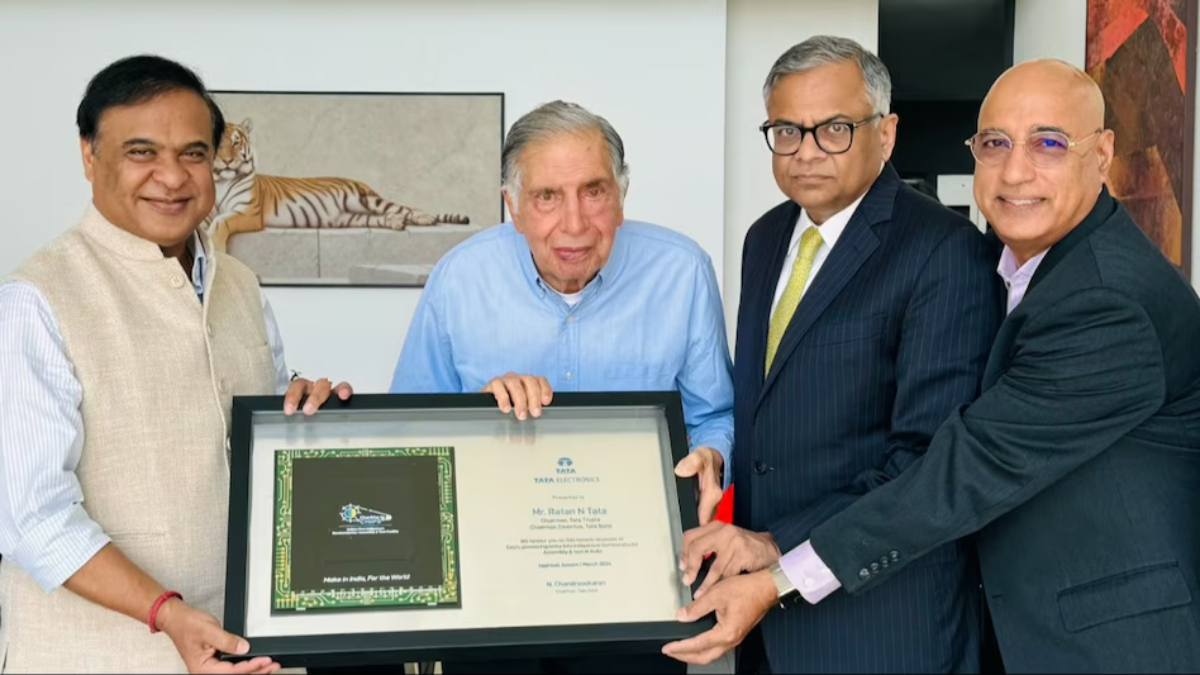The timeline set forth by the Tata Group is notably aggressive, aiming to commence commercial production of the 28 nm semiconductor chip as early as 2026.
Ratan Tata announced on March 20 that the Tata Group will embark on a groundbreaking venture, establishing a cutting-edge semiconductor manufacturing facility in Jagiroad, Assam. With a monumental investment of ₹27,000 crore, this initiative is poised to revolutionize not only the regional economy but also catapult Assam onto the global stage.
The manufacturing facility represents a pivotal milestone in India’s journey towards technological self-sufficiency, particularly in the realm of semiconductor production. By undertaking this ambitious project, the Tata Group is laying the groundwork for India’s emergence as a major player in the global semiconductor market.The timeline set forth by the Tata Group is notably aggressive, aiming to commence commercial production as early as 2026.
This sense of urgency underscores the pressing need to reduce India’s dependency on imported semiconductors, which power an array of essential technologies spanning from smartphones to critical defense systems.
The semiconductor fabrication unit, spearheaded by Tata Electronics Pvt. Ltd., will mark a historic first for India. It is slated to initiate operations by producing semiconductor chips with a cutting-edge technology starting at 28 nanometres. This technological prowess, combined with the strategic location in Assam, will not only drive economic growth but also foster innovation and skill development in the region.
Through this bold initiative, the Tata Group is not only investing in Assam’s industrial landscape but also paving the way for India to assert its prowess in the global semiconductor arena. This venture exemplifies the Group’s commitment to innovation, progress, and nation-building, serving as a beacon of hope for India’s future in the tech-driven world .
The establishment in Jagiroad, Assam is one of the select semiconductor fabrication endeavors greenlit by India, which also encompasses a counterpart facility in Dholera, Gujarat spearheaded by Tata-PSMC—a collaboration between Tata Electronics and Taiwan’s Powerchip Semiconductor Manufacturing Corp. This announcement was made during a foundation laying ceremony in Dholera, coinciding with the unveiling of plans for three semiconductor fabrication units.
These include the two Tata initiatives and an outsourced semiconductor assembly and test facility operated by CG Power and Industrial Solutions Ltd in partnership with Japan’s Renesas Electronics Corp. The collective investment earmarked for these ventures approximates around ₹1.25 trillion. Additionally, India is in the process of scrutinizing a separate $11.5 billion semiconductor fab project proposed by Israel’s Tower Semiconductor.
CM Himanta Biswa Sarma stated that these centers and semiconductor manufacturing units would empower the youth not just in Assam but the entire Northeastern Indian region by offering them courses in niche domains such as artificial intelligence, semiconductor production and electronics building a foundation for securing employment at the Jagiroad unit. Sarma also further added how 1500 odd youths from Assam, predominantly women, are currently undergoing training in Bangalore at the existing Tata facilities which will help them secure a leadership position once the semiconductor establishments become operational in 2025.
In Assam, the Tata Group is committed to generating 25,000 additional employment opportunities, thereby contributing significantly to the region’s socio-economic development. According to Chandrasekaran, the technological versatility on 28 nm chip with its future advancement to 22mm, underscores the Tata Group’s commitment to staying at the forefront of semiconductor innovation and meeting the evolving demands of the global market. The semiconductor chip shortages experienced during the global pandemic-induced lockdowns served as a wake-up call, highlighting India’s overreliance on international supply chains. Recognizing this vulnerability, the Tata chief emphasized the imperative of establishing a robust domestic semiconductor industry.
On March 13, Prime Minister Narendra Modi inaugurated three semiconductor facilities, collectively valued at approximately ₹1.25 lakh crore – two in Gujarat and one in Assam. Of these, Tata Group is spearheading two, one in each state. Tata Semiconductor Assembly and Test Pvt Ltd (TSAT) is constructing a semiconductor unit in Morigaon, Assam, at a cost of ₹27,000 crore. With a capacity of producing 48 million chips daily, this facility targets industries including automotive, electric vehicles, consumer electronics, telecom, and mobile phones. The Tata Group anticipates commercial production of semiconductor chips from these Gujarat and Assam plants, slated to commence in 2026.
